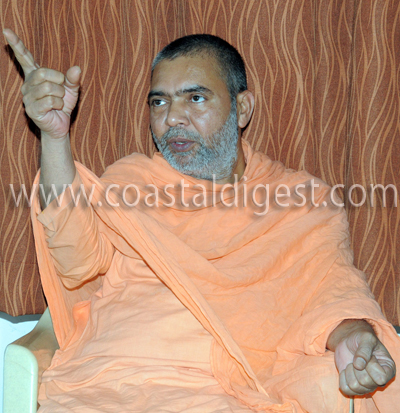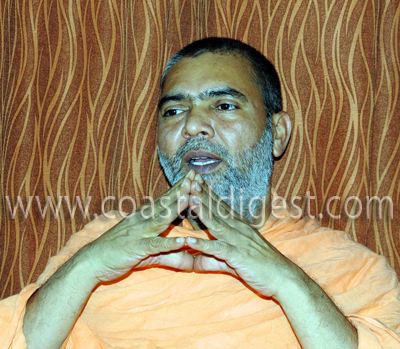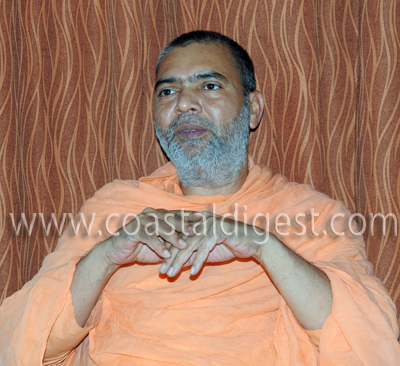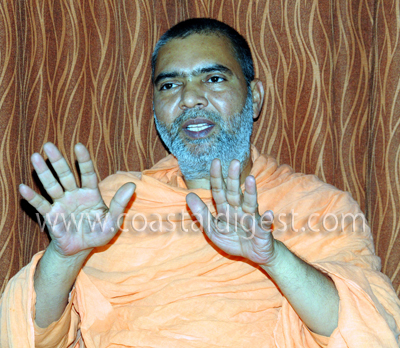 Veerabhadra Channamalla Swamiji, chairman of Nidumamidi Mahasamsthana and Manavadharma Peetha, is known for his no-holds-barred views on contemporary socio-political issues. But, his penchant for courting controversies has seen him being criticized as a publicity monger. However, At 52, he is one of the reformist swamijis of Karnataka having a set of dedicated followers who seek to portray humanity as the true religion. In an exclusive interview with Aysha Tafheem, he shares his ideas about Made Snana, corruption and other contemporary issues.
Veerabhadra Channamalla Swamiji, chairman of Nidumamidi Mahasamsthana and Manavadharma Peetha, is known for his no-holds-barred views on contemporary socio-political issues. But, his penchant for courting controversies has seen him being criticized as a publicity monger. However, At 52, he is one of the reformist swamijis of Karnataka having a set of dedicated followers who seek to portray humanity as the true religion. In an exclusive interview with Aysha Tafheem, he shares his ideas about Made Snana, corruption and other contemporary issues.
Q: What is your take on Made Snana? You have launched a campaign against it. You have also given a deadline for the Government to ban it. But are they not part of our customs and tradition?
Swamiji: Beliefs can be divided into two categories. The beliefs which are not harmful to either the person practicing it or the society at large, need not be opposed. But the beliefs which have a harmful effect on the one practicing it and the larger society have to be discontinued. You cannot imagine a religion without beliefs or a society devoid of customs. We can condone beliefs which are not dangerous and which are not detrimental to the wellbeing of the society. People derive some sort of solace through such beliefs and therefore they are not objectionable. But there are some beliefs which had been imposed on people with a motive.
The vested interests in every society will try to create such beliefs. You can call them as priestly class or the ruling class. Every such belief is invariably propped up by vested interests, which can be cultural, political, social or religious. No belief will emerge from thin air. The beliefs are created by certain groups to safeguard their interests. Made Snana or Made Sevane, or Pankthi Bedha and similar other beliefs have been created by the priestly class of the respective kshetras or the poojaris of the respective temples.
Made Snana cannot be called a vow (harake) because it is basically a punishment given to the backward class people by the upper class. This is a punishment much like untouchablity and pankthi bedha. Unfortunately they are practicing it as ‘harake’ unmindful of the fact that there is a vested interest behind it. Secondly, the practice of rolling on plantain leaves left behind by Brahmins is being performed as a ‘harake’ by people with the hope that it will cure their skin problems and put an end to their barrenness. But there is no medical evidence to show that the ‘enjalu’ (leftovers) of Brahmins has remedy for skin diseases.
The practice cannot be justified because few Brahmins also take part in such a ritual. This is not a question of whether those taking part in the ritual are Brahmins or non-Brahmins. Nobody should be allowed to practice such a custom. It is a question of human dignity.
The practice of rolling on the leftover food in itself is inhuman, uncivilized behavior. This cannot be condoned in the name of religion. This is a practice popped up to exploit people in the name of religion and devotion. Even if there is any mention of such a practice in the ‘Shastras’ it is not acceptable. Those in the government should realize that constitution should be their guiding force and not any purana, panchanga and prabandha. No civilized society will accept such a practice which is a blot on humanity and a blow to the self-respect and dignity of the human beings. This is not only anti-constitutional, but also anti-religious and anti-nature. No government can support such a demeaning practice. Any government condoning such a practice cannot be considered as a civilized government.

Q: But, can the practice be abolished through ban?
A: If you look at India’s history, successive governments have tried to abolish a number of social evils through such measures. The Portuguese had tried to abolish sati during their rule, but it was Raja Ram Mohan Roy who took the bold step and got the practice banned when Lord Bentinck was the Governor General of India. A number of other evils such as untouchablity, bettale seve, devdasi system, slaughtering of animals at temples had been declared illegal by enacting laws. These evils had existed in our society for ages.
But when the people started opposing these anti-human practices, the government of the time had to respond and take legal measures to ban them. All we are demanding now is that the government should consider ‘made snana’ as an evil and declare it unlawful. Let the authorities at Subrahmanya and Udupi temples, where the ritual is in vogue, declare that they are not going to allow such a practice from next year. Let us see if people will go to those temples and demand that they be given a chance to carry out the custom. The temple authorities have allowed the ritual to flourish as they have a steady revenue from it. It is also an opportunity for them to ascertain their caste supremacy. made snana is a bad, uncivilized and intolerable practice. It has to be banned.
Q: What about the Muzrai Minister V.S. Acharya’s statement that such practices cannot be banned through law?
A: As I have already stated there is a vested interest behind every such ritual. People do not follow them out of their own free will. It is imposed on certain sections of the society. Ministers should adhere to the democratic values and discharge their duties as per the constitutional norms. In a democratic system, it is a minister’s duty to uphold the sentiments of the majority of the people. It is unconstitutional on the part of the government and its ministers to promote blind beliefs and exploitation, and rally behind people supporting them. No government worth its name should indulge in such acts.
Q: You said the voice of the majority? But in Kukke Subrahmanya, the local people apparently threw teir weight behind the ritual? They had even observed a day-long bundh to protect the sanctity of the kshetra?
A: They have not observed bundh (on their own). They have been asked to act in a certain way. Those who are supporting the oppressive system are people afflicted by poverty, illiteracy and economic hardship. At the same time, they are naïve and innocent. But they are dependent on these forces for their livelihood. Since they are not able to live an independent life, they believe what their oppressors are saying. But once they realize the truth and manage to stand on their own feet, they will definitely discontinue such customs.
Q: You have been advocating revival of Dalit, backward class and farmer movements in the State? But all these movements have become non-functional today. Why do you still cling on to the ‘failed’ movements, which have only served the narrow interests of certain opportunist leaders?
A: I consider it as an issue related to human weakness. We should also consider the limitations of human beings. If you look at the history of movements, you will realize that it is impossible to sustain the same energy and enthusiasm for a long period. No-one has succeeded in that and nowhere this has succeeded.
Secondly, it is quite common that all the movements and struggles subsequently deviate from their original motive and their leaders start behaving contrary to what they had preached. We should look at it as a limitation of human beings. Also we should try to bring these people back on track and explore the possibility of infusing new life into the movements. I do agree that it is not possible to revive a failed movement completely without overhauling the whole structure and strengthening the core values. But we should also realize that it is impossible to find new leadership overnight.
Today our collective psyche has become corrupt. Out system has become corrupt. Only a massive revolution can change the entire system. If we succeed in eliminating the root cause of corruption, we could dream of a new system. Even if 100 Anna Hazares emerge, corruption cannot be wiped out completely. Even if hundred Ambedkars and Basavannas take birth in India, we cannot abolish casteism completely. These evils are deeply entrenched in our society. Therefore people should become the architects of revolution.
This has happened in France and Russia centuries ago. It has happened recently in Egypt. Unfortunately in India we don’t have leaders who can lead such a revolution nor do the people have the right mindset. In India, crores of people gather at river banks on a full-moon day or on amavas, but none is prepared to fight against injustice, exploitation and dictatorship. There is a complete lack of awareness. The ‘aam admi’ has confined himself to struggles related to his own existence. He thinks that nobody can change his fate. He feels satisfied if he has got his ration card. He thinks the government’s responsibility towards its citizens is confined to issuing ration cards and distributing some freebies. Neither the common people nor the leaders have a strong conviction about bringing about a change.
Even if people crave for change, the political, social and religious leadership ensure that any such attempt is nipped in the bud. Even though occasionally we see some churning, there is no desire on the part of the leadership to bring about a comprehensive change in the political and economic policies. But we cannot withdraw into despair and remain mute spectators. Despite our limitations, we will have to ensure that our people are able to lead a dignified and peaceful life. We will have to take into confidence all the leaders, who are split in different groups. They are also beset by inertia and in most of the cases have become corrupt. But we will have to renew the struggle by changing their heart and urging them to respond to the aspirations of the masses. We should impress upon these leaders that they cannot remain silent spectators when it comes to bringing about social change. The fight has to be launched on an ideological level keeping the health of the society as the ultimate objective.
The system can be overhauled only through revolution. We can expect the people to think differently when the system completely collapses and the situation becomes unbearable and left with no alternative but to fight. Until then, it is the duty of the awakened people and the leaders to keep the fight on. As a religious leader, I am trying to discharge my duties within my limitations. We cannot expect big results from these small efforts.

Q: But can we not try to bring in new leadership and guide the dalit, backward class and farmers’ movements in a dynamic way?
A: I am not a leader, I am a sevak (servant). No-one should try to become a leader. The ordinary masses should become the leader. The demands and aspirations of the people should be the leading force. Our movement should become our beacon light. Too much emphasis on leaders will turn people into a state of disillusionment. We cannot wait for avtars to come and fight our battle. This will lead to hero-worship and this is precisely the reason why overnight people like Anna Hazare and Ram Dev become demi-Gods. It is in our psyche to believe that some savior will come to change our destiny and set everything in order for us.
But, we should know that we will have to fight the evil on our own. We will have to set our own lives in order. Each one of us should try to conquer the evil present within ourselves. Every one of us should launch a fight against these evils. Each one of us have a responsibility towards our worldly life. Each one of us has an obligation towards our own self, towards our people and towards the land we live in. We should come out of illusions of some savior coming down from heaven to solve our problems. We should try to repair the damage. Every movement has its own limitations. It is also true that most of our leaders have deviated from their original path.
Today what we need is a people’s movement to bring the leaders back to the right track. We have to launch a big movement to reform our political, social and religious leaders. The noble-hearted people from all religious groups should unite on the basis of humanity, going beyond the barriers of caste, creed and religion and launch a concerted fight towards changing the system. People like Hazare on individual level cannot do any magic. He may have succeeded in creating awareness about one issue. But today the minds of the people have become corrupt. Today we are only talking about economic corruption. But corruption is present in in myriad forms.
We are plagued by intellectual corruption, social corruption, political corruption, religious corruption, administrative corruption. Our aim should be to change the human mind that has become corrupt. We need a multi-pronged strategy to tackle this evil. We should fight against both internal and external evils. Every individual should try to lead a noble life and try to improve the environment he is living in. We should not wait for avtars to arrive. It is a futile wait. Each one of us should realize that nobody will come to ameliorate our condition. We will have to clear the rot ourselves.
Q: Today religions institutions have become centres of power and wealth. Why don’t maths announce that they don’t take black money?
A: In my public life spanning thirty years (21 years as the head of the math and 10 years of my pre-Sanyas life) I have been strictly following some values and principles. I have made it a policy not to accept money coming from corrupt sources. I have clearly stated that I would not accept donations if its source is liquor business or bribery. I have adhered to these principles even if I had to suffer losses. Today, our math is one of the poorest in the State. But I have not deviated from my commitment and never compromised with the system. Unfortunately, today neither religious institution nor religious personalities have retained the moral courage to fight corruption. Religions have become patrons of corruption. They function as treasury of black money and native Swiss banks.
All the maths are today working towards material goals such as protecting their financial interests, getting closer to the ruling class, and enhancing their sway over the society. Nearly 99.9 per cent of religious leaders have become corrupt. Therefore I have been vociferously demanding that all the religious institutions should be brought under the purview of law. When they are exempt from the governmental regulation, they become a law unto themselves and the abuse of wealth becomes rampant. I have not heard even a single religious leader or a head of the math exhorting people not to donate their sinful earnings (papada hana) to their places of worship.
On the contrary, every religious institution is telling people that your sins will be forgiven if you contribute your wealth to the temple. The wealth of Sree Padmanabhaswamy Temple in Thiruvananthapuram is estimated to be more than Rs. 1 lakh crore. From where has this wealth come? It is generated by exploiting the ordinary masses. The wealth was stored in the temple because they felt it to be a safe treasury. Therefore, I have been telling the Government since two decades that the rich temples are acting as safety lockers for the ill-gotten wealth.
The government should regulate this wealth. Any donation above Rs. 100 should be duly acknowledged with receipts. The amount should be accepted only if donor provides the copy of his income tax returns. (Janardhan) Reddy donated eight to 10 bejeweled diamond crowns to different temples. The value of each crown was estimated to be between 85 and 90 crore rupees. It is obvious that the donation was made from the wealth he amassed by plundering the natural resources of the country. But even after Reddy was arrested and jailed for his illegal activities, none of the beneficiary temples offered to return the crown. If they had the slightest sense of morality, they should have asked the Government to confiscate the crown. But unfortunately today religions have become the epicentre of corruption. In Uttar Pradesh, when an office of Dalai Lama was raided, the authorities found crores of rupees and currencies of 39 different countries. People came out on the streets in anger. Unfortunately today religion is being used to protect the interests of certain groups and safeguard the interests of their castes. Religion is not being used for transforming the soul. There is a need to change the concept of religion.
Today every community, every caste has become corrupt. No religious group has stood up against injustice, oppression and corruption as a matter of principle. The Veerashaiva community backed Yeddyurappa when he was beset with allegations of corruption and Vokkaliga community rallied behind Kumaraswamy when charges were leveled against him. In fact, this is the limitation of human thinking. We do not find sadhaks and anubhavis, who could guide the society through their spiritual achievements. How do we reform the human mind by going beyond the boundaries of religion and caste is the biggest challenge. Today religions have failed. There is hypocrisy going on in the name of religion.
Q: Even other Swamijis say the same thing? Even Pejawar Swamiji keeps speaking about reforming human mind?
A: His (Pejawar) religion is varnashrama religion. It is a caste (based) system of religion. But for me, religion means humanity. His idea of religion does not go beyond varnashrama system. But my religion is universal in spirit. According to me the entire humanity is one. This is what I have learned through Manaava Dharma. Q: Pejawar has a market, and you also cater to a market? A: I am not a businessman. I don’t have a product (to sell) or a market (to catch). I am not a producer. Even in my dreams I would not dare to think on those lines.
The exploitation, oppression, atrocities, and injustice being committed in the name of religion on the masses are the motivation for all my activities. For me this fight is a natural reaction. My activities are neither aimed at appeasing anyone, nor hurting anyone. I do not have to gain anything by this.

Q: You have called Pejawar Swamiji a Dwandwacharya?
A: Yes, I had said that Pejawar Swamiji should be called Dwandwacharya, rather than Dharmacharya. I have enormous respect for him as an individual. He has been in public life for more than 50 years and has been responding to issues in his own way. For the last four decades he has been very active in public life. He has been talking about the unity of Hindus, the issues of religious conversion, untouchablity and dalit welfare. However, he has not been able to solve even a single problem faced by Dalits. He has not taken up even primary programmes for the reformation of Hindu society. He has been cheating people though his words and deeds, which are filled with hypocrisy. He does not have clarity about anything. On the one hand he talks about Hindu unity, but on the other he defends separate seating arrangements for the devotees in temple dining halls. He also keeps silent on the inhuman practice of Made Snana, which is in fact, a blot on our culture. Pejawar swamiji says he would neither oppose nor support the inhuman custom. What kind of social reform can one expect from a Swamiji who continues to divide people in the name of religion and caste, who refuses to come out of his false sense of superiority. How can he unite the people? We cannot expect any change or reform from him. He is in the true sense a dwandwacharya, a man full of contradictions.
Q: Why should we not allow informed people within the Brahmin community to raise their voice against made snana. It is alleged that intellectuals and progressive thinkers, including you, vitiate the atmosphere by your reactionary approach?
A: There are right-thinking people in every community and religion. It is the responsibility of the awakened people in every community to raise their voice against the evils in their society. But we need people who have a moral standing in every community to advice people against the evil customs. If they perform their duty in dignified way their stature also raises. But I don’t have any respect for those who speak only after weighing the profit and loss of their each word. There are a number of intellectuals across different communities, who are not only opportunists, but also selfish to the core. How many writers have retained the moral authority or integrity to guide the society when a wrong is being committed?
Those who speak after weighing the profits and losses remain silent when issues like made snana crop up. When they realize that there is something for them to gain, they come out and speak. There are people like G.K. Govind Rao who speak their mind openly. He is not bound by any constraints. Writers like U.R. Ananthamurthy appear confused at times. He speaks only after measuring the advantages and the disadvantages.
But I don’t keep worrying about them. I have enormous respect for those people who show honesty and commitment while reacting to different situations. They may not be as famous as some of our celebrated writers or intellectuals are. And also there are humanists in all societies and religions. There are people who promote virtue and condemn vice in every society. But their voice should gain strength. But unfortunately everything is being looked with the glasses of caste and religion.
Q: How do you see the developments in Dakshina Kannada? How do you respond to the initiatives undertaken by backward class leader Janardhana Poojary to usher in social change?
A: Vaidik religion or the Varnashrama system which professes Brahmin supremacy neither accepts the principle of human equality, nor shuns untouchability or caste prejudice. It does not abhor exploitation. It perpetuates all sorts of injustices and evils and seeks to retain the status quo. Therefore, those who think that they can reform their community within the Hindu religion, will succeed only if they follow the path shown by their spiritual leaders.
At the same time, if we want to free people from the evils and vices of the Vaidic system, we should revive and strengthen the non-Vaidic traditions and ideas of the earlier centuries. By strengthening the alternative religions and ideas, and rediscovering their independent and free traditions, these people can lead a life of dignity and self-esteem, which is also free from oppression.






Comments
Add new comment